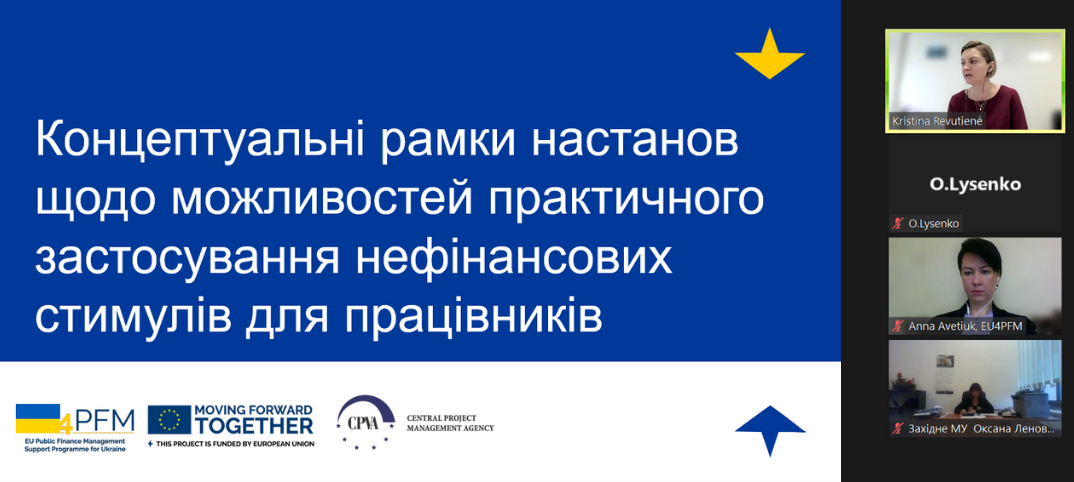Non-financial motivation is one of the effective mechanisms for attracting and retaining qualified staff for the civil service – EU4PFM expert Kristina Jakubaitytė-Revutienė
Almost 500 employees of the State Tax Service of Ukraine participated in the online workshop “Conceptual framework of guidelines on the possibilities of practical use of non-financial incentives for employees”, which took place on January 28, 2022, with the support of the EU4PFM project.
According to Kristina Jakubaitytė-Revutienė, an International EU4PFM Expert on HR / PAR, motivation remains one of the most important psychological factors responsible for employee performance and retention. “However, motivation cannot solve a problem in an organization where staff have low levels of leadership skills, where employees do not understand what managers expect from them, if there are too many forms of control in the organization, if there is no room for creativity or unproductive work processes,” – said Kristina Jakubaitytė-Revutienė. “Employees motivation is influenced by many factors and they all need their own solution.”

Usually, to better motivate employees, organizations seek to create incentive systems by combining financial (wages, salaries, bonuses, benefits, social security, etc.) and non-financial incentives (content, working conditions, ability to combine family and work responsibilities, ability to learn and improve qualification, career, recognition, participation in the decision-making process, the opportunity to show initiative, freedom in the decision-making, etc.). But new ways to motivate are wanted.
What motivates public sector employees the most?
A survey done among the civil servants in the EU Member States has shown that it is not the salary but the content of work that is one of the most important incentives to motivate the civil servants.
Public administration institutions try to motivate the civil servants by increasingly diversifying their activities, i.e., they delegate more responsibilities to the civil servants, give them more autonomy, use flexibility in controlling their activities, offer various forms of participation in the decision-making.
More than 70% of respondents indicated that they have a very good or good working conditions, also noting the career opportunities, flexible working hours, autonomy at work and so on.
According to a common practice, awards are used as the main non-financial incentive in the public sector, along with the application of official sanctions to the civil servants for their violations. However, experts note that the supportive working environment and leading role of a manager are no less motivating for the civil servants.
During the workshop, Kristina Jakubaitytė-Revutienė, an International EU4PFM Expert on HR / PAR, spoke about the conceptual framework of non-financial incentives and gave examples of the best practices from Lithuania, the UK, Iceland, and other European countries. She also presented an analysis of actual list of non-financial incentives at the STS and project proposals to expand the list of non-financial incentives that can be introduced in the civil service.

